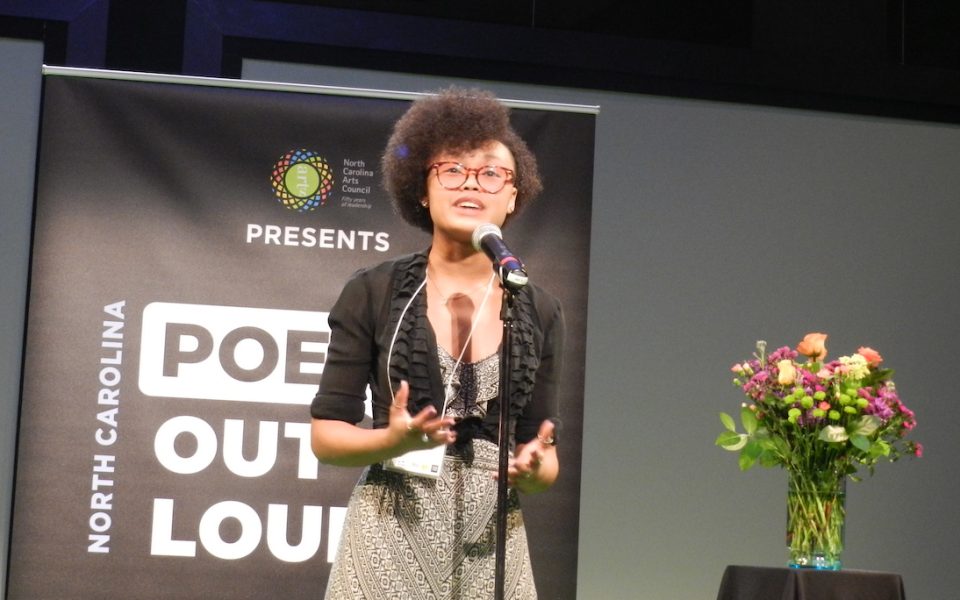As
the crowd quiets, Dasan Ahanu rubs his hands together.
The
friction creates a sort of humming that travels through the room. The attendees
join in, frantically running the palms of their hands together, contributing to
the sound. Ahanu says it all adds to the energy.
Ahanu
skips the applause as he amps everyone up for the reveal of the final five
contestants in the annual statewide Poetry Out Loud competition. After a series
of smaller competitions at the classroom, school-wide and county-wide levels,
high-schoolers from more than 30 schools across North Carolina gather at Triad
Stage in Greensboro. They spend a recent Saturday reciting poems by other
authors, vying to go to the national competition in Washington, DC.
The
National Endowment for the Arts puts on the contest each year with help from
the Poetry Foundation and, on the state level, the North Carolina Arts Council.
The 2020 contest marks its 15th year nationally. Other than spots in
the national finals, the student winner and runner-up each receive a check and
small funds for their high schools to purchase poetry books of the students’
choosing. Rebecca Moore, senior program director of marketing of the North
Carolina Arts Council, finds that the challenge helps students to get more
involved with creative writing.
“It’s a recitation contest, but it’s so much more,” Moore says. “It teaches the theatrics of the written word.”
For
the final round, each student takes turns reciting poems, line for line. They
go for two rounds until the final cut is made, leaving only five students to
perform a third.
“The
kids can pick a poem that speaks to them,” Moore says.
As
the emcee, Ahanu ushers many students up to the microphone, listening to how
each analyzes their poem. From his work as a creative writing professor at
Saint Augustine’s University in Raleigh, along with his other work, he finds
that adding the competitive edge encourages a closer connection with the works.
“As
an educator,” Ahanu says during a brief interlude, “this is a good way to get
them familiar with the poems that are part of our poetry tradition.”
Talia
DeStasio, a junior from Wake County, steps up to the microphone in the center
of the green-carpeted stage. After adjusting it to her height, she begins the
recitation of her first finalist poem — “1969” by Alex Dimitrov.

“The
summer everyone left for the moon,” she proclaims, “even those yet to be born.”
She
goes through the poem in a romantic tone, recasting the moon landing, the space
race, entwining them with hope for the future. She suddenly drops her cadence
to deliver the kicker.
“We
came in peace for all mankind,” she says. “Then returned to continue the war.”
This
year’s competition is DeStasio’s third, and it lands her in the runner-up spot.
She explains that the difficulty of memorizing so many poems has given her even
more of a love for literature. She finds that the best way to approach the
challenge is by exploring each piece — figuring out what’s behind the
figurative language.
“Poetry is a different kind of story,” DeStasio says.
For
Marrianna Flores, a senior from Atkins High in Forsyth County, the final round offered
a chance to share three such stories from three different poets. Her first poem
walks through the process of writing, her tone growing frantic or more relaxed
as the process grows difficult or easier. She finishes the finals with a poem
that carries a more formal structure: “The Paradox” by Paul Laurence Dunbar.
She
takes a more comedic approach for her middle piece. Having near to no
experience with more humorous subjects in the medium, Flores tackles “End of
Days Advice from an Ex-Zombie,” by Micheal Derrick Hudson.
“To
think,” Flores begins, “I used to be so good at going to pieces, gobbling my
way through the cops.”
Her
voice grows nostalgic, filling in the role of the Ex-Zombie, addressing the
audience through undead memories and questions about humanity. She goes
staccato, the fantastical subject turning into a metaphor for people’s own
lives.
As
the day ends, Flores hears the announcement that her performances set her in
first place. The win, other than sending her to the national competition,
symbolizes her love of creative writing, as a poet herself.
“Poetry
is a very big outlet in my life,” Flores says. “And it’s gotten me here.”
For more information about Poetry Out Loud, visit poetryoutloud.org.
Join the First Amendment Society, a membership that goes directly to funding TCB‘s newsroom.
We believe that reporting can save the world.
The TCB First Amendment Society recognizes the vital role of a free, unfettered press with a bundling of local experiences designed to build community, and unique engagements with our newsroom that will help you understand, and shape, local journalism’s critical role in uplifting the people in our cities.
All revenue goes directly into the newsroom as reporters’ salaries and freelance commissions.


Leave a Reply